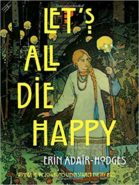
Review: Let’s All Die Happy by Erin Adair Hodges
Reviewed by A.N. DeJesús

Let’s All Die Happy
Poetry by Erin Adair Hodges
University of Pittsburgh Press, October 2017
$15.95, 112 pp.
ISBN-13: 978-0822965145
Erin Adair Hodges’ poems are unabashedly human. Unafraid to explore emotional depths, Let’s All Die Happy resonates in ways that are difficult to articulate but are readily felt. Hodges touches on many experiences, such as motherhood and loneliness, in a voice self-aware and full of wit. This collection is rife with examples of deathly domesticity. This toxicity of tradition is expressed with nuance and honestly, offering a refreshing perspective on the difficulties of balancing family with the individual.
Hodges expertly evokes a blatant tone throughout the collection. In “The Last Judgment,” she paints a scene of claustrophobic domesticity. The speaker is surprised that domestic life would prove to be suffocating:
I am the ghost of the house I live in–
old me-phantoms surround, fuck around with the furniture,
make all the mirrors tell the truth. One night I have a dream
my husband leaves and the nightmare part is that I’m
relieved and so I finally see who I am.
The speaker’s pain and confusion are palpable, perfectly capturing the terror that sets in when one realizes a dream is nothing more than a trap. This image of a “me-phantom” that the speaker constructs throughout the collection evolves from piece to piece as more of the past is revealed and reflected upon. Hodges calls attention to the truly dynamic relationship many women have with motherhood and domestic life.
In addition to exploring the pitfalls of home life, Hodges also delves into the complexities of motherhood and post-partum depression. The heart-wrenching pieces that touch on this empty ache maintain a sense of authenticity due to a fearless acknowledgement of the complexities of maternity usually shied away from. Hodges bravely creates a narrative for women who are told to be quiet, to suffer in silence. In “My Son, the Night Light, the Dark,” this theme reaches its peak in the collection. The speaker describes a night that her son needs comforting:
He asks me to lie with him
until the stars disappear. I have things
to do, corners of myself to crawl into,
but I lay my body next to his and ask him
what he sees in his head. No one, he whispers,
likes me. As if he’s read from the book
I wrote.
Hodges heartbreakingly communicates the speaker’s fear that her emptiness has somehow been passed to her son. She speaks of the commonality between them, and the feeling of knowing that she brought this child into a world that would undoubtedly harm him. The idea of motherhood being terrifying, of existing outside the realm of glowing femininity and fulfillment, is illuminated.
Hodges poetry is of heartbreak and wonder, fear and love, motherhood and loneliness. These binaries constructed throughout the narrative are refreshing and necessary, expertly composed with wit and honestly. Let’s All Die Happy celebrates unabashed womanhood with all of its complexities and dimensions. Hodges embraces this unique struggle for equilibrium in pain and beauty in this stunning book.
A. N. DeJesús is a technical writer and poet out of Kansas City, Missouri. She recently received honorable mention in the 2018 David Baker Awards for Poetry and has been awarded a fellowship to Martha’s Vineyard Institute of Creative Writing. DeJesús holds a BA from the University of Central Missouri and is currently the Web Editor for Pleiades.

Leave a Reply